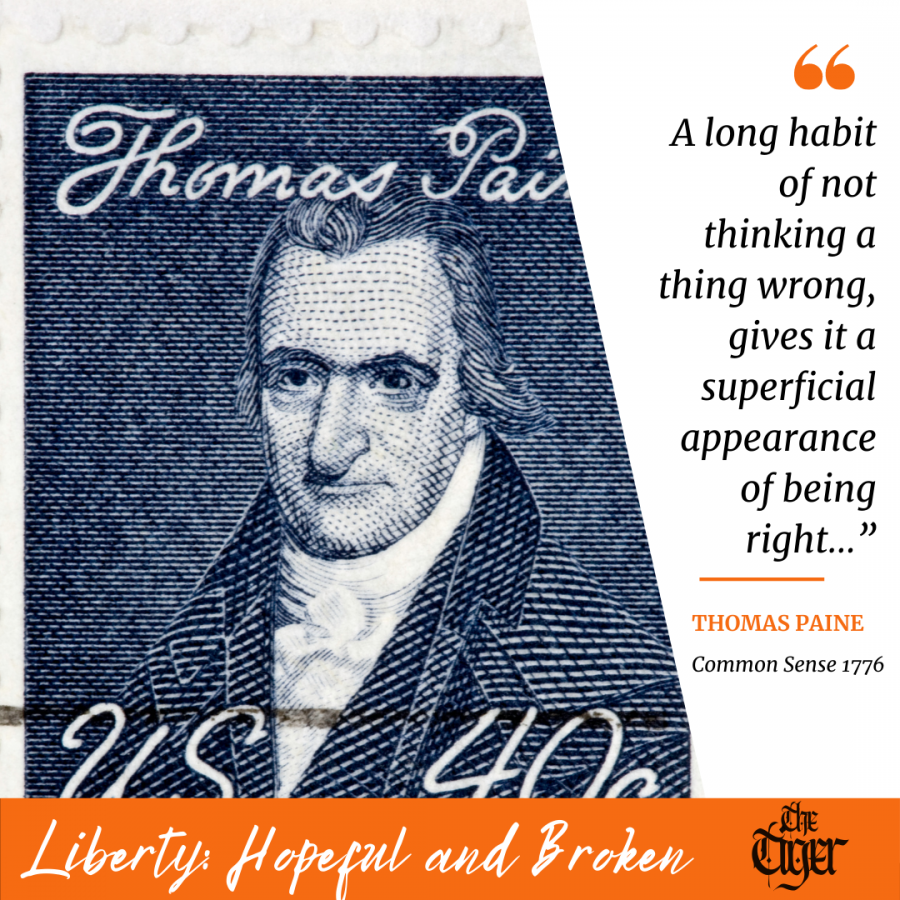Liberty: Hopeful and Broken
“A long habit of not thinking a thing wrong, gives it a superficial appearance of being right…” (1 Paine).
To start off our exploration with problems, it seems that any type of government is wrong in someone else’s eyes. The hard part of forming and governing a country is finding what would be best for the majority of the people. The Founding Fathers of the United States, however, considered more on equality between the governing and the governed. Thomas Paine wrote in his 1776 pamphlet, Common Sense, “Society is produced by our wants, and government by our wickedness; the former promotes our happiness positively, by uniting our affections; the latter negatively, by restraining our vices […] the first is a patron, the last a punisher”(3). These words certainly rang true back then, and in a way, still does today. Try thinking of the government, more specifically the executive branch, as a parent. When you do something wrong, your parent wouldn’t just say it’s ok, rather they would give you a time out or ground you. They would give you a sentence. However, the sentence should be fair to the broken rule. Alexander Hamilton and George Washington stated in Washington’s Farewell Address, “Respect for its authority, compliance with its laws, acquiescence in its measures, are duties enjoined by the fundamental maxims of true liberty. The basis of our political systems is the right of the people to make and to alter their tions of government” (1). These statements only begin the conversation that the guide of the laws exist simply to help us grow as a nation. Police officers and judiciaries are only condemning you for actions you’ve already committed. However, violation of this simplicity by either side of the law,will be discussed later.
Though many of these wounds are due to failure on the part of citizens and their government, some come from warnings that we, as a nation, have either failed to listen to or have been failed to be taught. One of these warnings comes from the farewell address of George Washington, in which he says:
“In the place of the delegated will of the nation the will of a party, often a small but artful
and enterprising minority of the community; and, according to the alternate triumphs of
different parties, to make the public administration the mirror of the ill-concerted and
incongruous projects of faction, rather than the organ of consistent and wholesome plans
digested by common counsels and modified by mutual interests” (1).
Meaning, that due to your affiliation with the party, you are automatically assumed to believe all of what that said party stands for. For example, paganism, how many times have you been asked why you worship Satan? Or Mexican-Americans, how often have you been assumed to need financial help because of your skin tone? America is the most diverse country in the world. Every single one of us has something alike and many things different. We’ve had presidents who are of vastly different religions, cultures, backgrounds, and races. Yet their party seems to be the main focus. Washington states again in his address,
“The alternate domination of one faction over another, sharpened by the spirit of revenge,
natural to party dissension, which in different ages and countries has perpetrated the most
horrid enormities, is itself a frightful despotism. But this leads at length to a more formal
and permanent despotism. The disorders and miseries which result gradually incline the
minds of men to seek security and repose in the absolute power of an individual; and
sooner or later the chief of some prevailing faction, more able or more fortunate than his
competitors, turns this disposition to the purposes of his own elevation, on the ruins of
public liberty”(1).
And it’s true. If you look at members of the Senate and the House, the first thing they’ll tell you is which party they belong to. This makes the difference in the whole country and it’s cruel. Suddenly, congress members’ beliefs don’t matter anymore. Now, they can’t vote for what they want because their party is against that. And what if the person they’re running against next term exploits that? Their time in office becomes more about winning their next election, not about faithfully representing their constituents.
This hostile reaction towards anyone brings me to my next point, the toxicity of politicians. From the Office of the President, to law enforcement, anyone working for the government has an 85 percent guarantee of putting their opponent down rather than building themselves up. Paine wrote about this in comparison to the medical field, “…every political physician will advise a different medicine” (7). This “medicine” is usually, unfortunately, the politician themselves.
Another symbol of this lethal behavior is when a politician acts as if they’re above the law and acts as if they hold qualified immunity. Washington states again that, “The very idea of the power and the right of the people to establish government presupposes the duty of every individual to obey the established government. All obstructions to the execution of the laws, all combinations and associations…” (1). No one is above the law, which is also stated in our constitution; to restrain the power, all branches of our government, executive, legislative, and judicial alike, have built in checks and balances, “ Liberty itself will find in such a government, with powers properly distributed and adjusted, its surest guardian” (1 Washington). However, allow me to bring up another point, bringing debate to this separation. If the President is equal in power to the Legislature and Supreme Court, then how come the Supreme Court Justices have been appointed inconsistently? In 2016, Justice Antonin Scalia died before President Barack Obama left office, leaving him to fill the space. However, due to the Constitution’s construct, the Legislature must approve of the judicial choice, meaning that they can push it off as well as revoke the president’s candidate. So, when Justice Scalia died, President Obama sent in requests to appoint a new Justice to the court, but was declined due to a Republican controlled Congress. However, when Justice Ruth Bader Ginsberg passed away, the Senate and House of Representatives quickly replaced her while President Donald Trump was in charge. This is a perfect example of inconsistent political bias. Another statement supporting this is again from Washington’s address saying, “It is important, likewise, that the habits of thinking in a free country should inspire caution in those entrusted with its administration, to confine themselves within their respective constitutional spheres, avoiding in the exercise of the powers of one department to encroach upon another” (1). However, now our branches of government seem to be competing with each other for more power.
Although all of these problems have been brought to the surface, there are changes we are able to make. Calling out what is wrong is only the start of being a citizen, fixing it makes a change. Washington tells us after 40 years of service to the United States, “If, in the opinion of the people, the distribution or modification of the constitutional powers be in any particular wrong, let it be corrected by an amendment in the way which the Constitution designates” (1). Now, going back to the beginning, Thomas Jefferson wrote the first paragraph of the Declaration of Independence, which started this country by saying,
“We hold these truths to be self-evident, that all men are created equal, that they are
endowed by their Creator with certain unalienable Rights, that among these are Life,
Liberty and the pursuit of Happiness.–That to secure these rights, Governments are
instituted among Men, deriving their just powers from the consent of the governed,
–That whenever any Form of Government becomes destructive of these ends, it is the
Right of the People to alter or to abolish it, and to institute new Government, laying its
foundation on such principles and organizing its powers in such form, as to them shall
seem most likely to effect their Safety and Happiness” (1).
53 Representatives sat down and said THIS is what we want for my life, my children, and my children’s children. They said these are everyone’s rights. Gentile, Jew, man, woman, black, brown, white, left, right, it doesn’t matter. We have a right to change what we think needs to be changed. No one is stopping you from going out and joining politics just to set it right; but keep in mind that you’re never alone in your thoughts. Someone agrees. Just gotta find them.
Bibliography
Jefferson, Thomas. “Transcript of Declaration of Independence (1776).” Our Documents – Transcript of Declaration of Independence (1776), 1776, www.ourdocuments.gov/doc.php?flash=false&doc=2&page=transcript.
Paine, Thomas. Common Sense. 20th ed., Fall River Press, 2013.
Washington, George, and Alexander Hamilton. Transcript of President George Washington’s Farewell Address (1796). 19 Sept. 1796, www.ourdocuments.gov/doc.php?flash=false&doc=15&page=transcript.

Favorite Quote: Curiosity killed the cat, but satisfaction brought it back. - Unknown
Favorite Food: Chicken and Dumplings, with mashed potatoes and carrots
Fun Fact: I am an only child with at least 4 siblings







